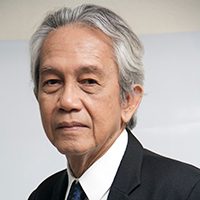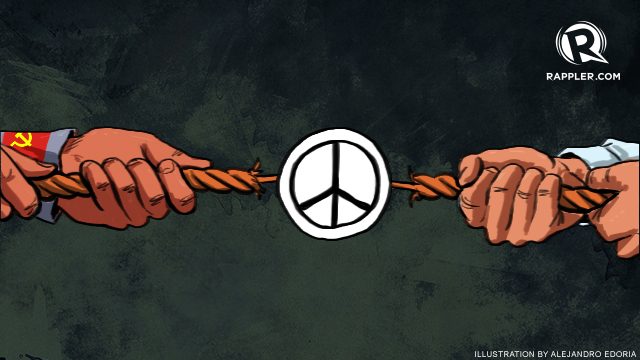SUMMARY
This is AI generated summarization, which may have errors. For context, always refer to the full article.

Leave it to Duterte to surprise everyone. First he lifts the government’s ceasefire with the New People’s Army (NPA), then the next day calls a stop to talks altogether.
Angered by NPA attacks on the military even before their announced February 10 ceasefire lifting, Duterte has regained the momentum in talks with the Communist Party of the Philippines (CPP). The ball is now in the rebels’ court.
Peace talks with the CPP have gone further than at any time in the past under Duterte. He has released the most important leaders of the CPP. He has, for all intents and purposes, formed a coalition government prior to a political settlement by appointing three CPP people to Cabinet positions. He has generated a political mood supportive of talks.
The CPP has been playing hard ball, shaping the process to its best advantage. The CPP’s announcement that it was lifting its ceasefire was yet another attempt to gain even more advantage. A serious ceasefire would work against the CPP. In theory, they should stop extorting from vulnerable businesses. “Revolutionary taxation” only works if there is a credible threat of punishment, burning buses, construction and other equipment.
It is striking that the ceasefire lifting was announced by “Ka Oris,” a longtime leader of the NPA in northeastern Mindanao. It is reliably reported that this area has been the main source of CPP funds for years. Illegal loggers and miners have been “protected” by a syndicate of local NPA and corrupt military.
The CPP’s other announcement, that it does not see a political settlement for several years, at least until 2020, should also be seen in this context. If indeed the CPP gives up the armed struggle, it needs to be able to show other sources of political power, most importantly a capacity to win elections.
The electoral success of CPP front party-list groups is anchored on its ability to collect fees for its “permit to campaign” and votes negotiated with local politicians. Without the threat of armed retaliation, this electoral strategy would not work. The next election is in 2019. The CPP needs to be able to show increased electoral capacity before (if it is serious about) a political settlement.
CPP’s distinct political advantage
The best possible conditions for the CPP negotiating strategy would have been a one-sided ceasefire. Maybe the CPP thought that Duterte has been bending over backwards so much he might as well bend some more. They were probably surprised by the rapid-fire Duterte announcements. It would not have been the first surprise. Government people have been hinting that CPP negotiators in Rome were blindsided by Ka Oris’ announcement.
It should be noted that the CPP accuses the military of ceasefire violations, not for initiating armed attacks on the NPA, but simply for being in place in areas claimed by the CPP. Though not yet made explicit as a demand, this is a key element in the CPP’s framework, being recognized as a co-equal government with its own territory, armed force and legitimate right to collect taxes. The CPP has also claimed co-equal power in supervising the implementation of major political and economic reforms prior to giving up its guns. Thus the demand for a multi-year negotiating process.
In the past week CPP spokespersons have been saying that it is alright to continue talks even if there’s a renewal of fighting.
As long as the CPP remains in government, at the very top, in the Cabinet, while criticizing key government policy, it retains a distinct political advantage. As long as the talks continue, the CPP can continue to gain military and political strength.

At a certain point, Duterte will have to decide whether to live with this kind of situation. Having ended negotiations, Duterte now has to decide whether he wants CPP people in his Cabinet.
In Davao City a similar situation was possible because the local NPA did not claim to be a co-equal government. As president, Duterte has to decide whether he wants a coalition partner which is killing government soldiers and collecting taxes.
Internal problems
The CPP has its own problems. There have been rumors for months that local NPA commanders have not been as enthusiastic about the talks as Sison and his faction in the CPP leadership. The local NPA leadership, especially in places where it has established ways to generate financial resources, can operate indefinitely.
CPP negotiators have to worry about whether it can get local NPA commanders to give up its guns after a political settlement. The aging Sison leadership needs a conclusion to the peace process that carves out a significant political position for the party. Will peace be served by yet another major split in the CPP?
Despite Duterte’s announcement of an end of negotiations, my bet is that it will continue. To put pressure on the CPP, the government has to strengthen its negotiating position. It will have to equalize the political negotiating balance by all means short of, but in the end, possibly including removing CPP people from the Cabinet. It has to find a way to persuade the CPP that prolonging the negotiations will not enable it to become stronger.
Strangely enough, peace may have a chance only if the government takes a hardline position matching that of the CPP. – Rappler.com
Joel Rocamora is a political analyst and a seasoned civil society leader. He finished his PhD in Politics, Asian Studies, and International Relations in Cornell University, and had headed the Institute for Popular Democracy, the Transnational Institute, and the Akbayan Citizens’ Action Party. He used to be the Lead Convenor of the National Anti-Poverty Commission under the administration of former president Benigno Aquino III.
Add a comment
How does this make you feel?
There are no comments yet. Add your comment to start the conversation.